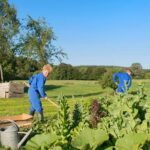Organic vegetable gardening is gaining popularity rapidly as people become more conscious of the importance of sustainable and healthy living. Whether you have a spacious backyard or limited space on your balcony, organic vegetable gardening allows you to grow your own fresh and nutritious produce while minimizing the use of harmful chemicals.
To embark on this journey successfully, it’s crucial to have reliable resources that provide guidance and knowledge on organic gardening techniques. This article aims to highlight the best books available on organic vegetable gardening and how they play a key role in learning about this beneficial practice.
Organic vegetable gardening offers numerous benefits for individuals and the environment alike. By growing your vegetables organically, you can ensure that your food is free from synthetic pesticides, herbicides, and genetically modified organisms (GMOs). Organic produce is not only healthier for consumption but also contributes to preserving biodiversity and reducing water contamination.
As such, it’s no surprise that more people are turning to this sustainable method of cultivation. However, for beginners looking to dive into organic vegetable gardening, getting started can be overwhelming without proper guidance.
Books serve as valuable tools in learning about organic vegetable gardening as they provide comprehensive information on different aspects of cultivation. From soil health management to pest control strategies, these books offer step-by-step instructions and insights into successful organic gardening practices. Additionally, they often include practical tips based on expert experiences and research. With a wide range of books available in today’s market catered to different skill levels and interests, selecting the right ones becomes crucial.
In the following sections, we will delve into the specific factors to consider when choosing books on organic vegetable gardening based on expertise level and coverage comprehensiveness. We will explore the best books for beginners that cover fundamental concepts along with essential tips for successful growth. Furthermore, we will discuss advanced gardening books that provide more detailed techniques suitable for those seeking further knowledge or expanding their skills.
In addition to that, we will highlight books focused on organic pest management, disease prevention, soil health, specific vegetable varieties, and year-round gardening techniques. By the end of this article, you will have a comprehensive understanding of the best books available to enhance your organic vegetable gardening journey.
The Benefits of Organic Vegetable Gardening and why it’s becoming increasingly popular
Organic vegetable gardening has gained popularity in recent years due to its numerous benefits. More and more people are discovering the advantages of growing their own food organically, not only for personal satisfaction but also for health and environmental reasons.
Health Benefits
One of the main benefits of organic vegetable gardening is the production of healthier and more nutritious food. By cultivating plants without the use of synthetic pesticides, herbicides, and fertilizers, organic gardening ensures that the produce is free from harmful chemicals. This means that individuals who consume these fruits and vegetables can enjoy a higher level of nutrients, vitamins, and minerals, which contribute to better overall health.
Additionally, organic gardening promotes biodiversity by maintaining a diverse range of organisms in the garden ecosystem. The presence of beneficial insects, birds, bees, and earthworms helps to control pests naturally and improve pollination. This not only leads to better crop yields but also provides a more balanced ecosystem that supports various wildlife populations.
Environmental Benefits
Organic vegetable gardening plays a significant role in protecting and preserving our environment. Traditional agricultural practices often rely heavily on synthetic chemicals that can have detrimental effects on soil health, water quality, and the overall ecological balance. On the other hand, organic gardening minimizes chemical inputs and focuses on natural methods such as composting, crop rotation, and companion planting.
By adopting organic techniques in our gardens, we can reduce soil erosion caused by excessive tilling and negative impacts on water systems due to runoff contamination. Organic agriculture also promotes soil fertility by encouraging the use of compost or other organic matter to improve soil structure and retain moisture levels naturally. With less reliance on non-renewable resources like fossil fuels for chemical production or transportation, organic farming has a lower carbon footprint compared to conventional methods.
Overall, the increasing popularity of organic vegetable gardening stems from its ability to provide healthier food choices while conserving our environment for future generations. This positive impact on personal well-being, sustainability, and the planet’s overall health makes organic gardening an appealing option for many individuals today.
Factors to consider when selecting books on organic vegetable gardening
When it comes to selecting books on organic vegetable gardening, there are a few key factors that should be considered. These factors can greatly impact the success of your gardening journey and the amount of knowledge you gain from these resources. It’s important to choose books written by experts in the field, as their experience and expertise will provide reliable information and advice.
Expertise
One of the most important factors to consider when selecting books on organic vegetable gardening is the expertise of the author. Look for authors who have a background in organic gardening or who are well-known and respected in the gardening community. This ensures that the information provided in the book is accurate and based on experience.
Clarity of Instructions
Another factor to consider is the clarity of instructions provided in the book. Clear and concise instructions make it easier for beginners to understand and follow along with the gardening process. Look for books that provide step-by-step instructions, illustrations, and diagrams to help simplify complex concepts.
Comprehensive Coverage
Comprehensive coverage is also an important factor when selecting books on organic vegetable gardening. A good book should cover all aspects of organic gardening including soil preparation, plant selection, planting techniques, pest management, disease prevention, and harvest tips. It should provide a holistic understanding of organic gardening practices so that gardeners can successfully grow their own vegetables.
By considering these factors when selecting books on organic vegetable gardening, you can ensure that you are choosing resources that will provide you with trustworthy information, clear instructions, and comprehensive coverage. Investing in quality books will enhance your knowledge and skills as a gardener, ultimately leading to successful and fulfilling experiences in your own organic vegetable garden.
Section on the best books for beginners
For those new to organic vegetable gardening, having a reliable guide is essential for getting started on the right foot. Fortunately, there are several excellent books available that cater specifically to beginners. These resources offer easy-to-follow instructions, cover the basics of organic gardening, and provide essential tips to help novices navigate their way through the process.
One highly recommended book for beginners in organic vegetable gardening is “Rodale’s Basic Organic Gardening” by Deborah L. Martin. This comprehensive guide covers all the essentials, including soil preparation, seed starting, planting techniques, pest management, and more. The book also provides valuable information on composting and maintaining soil health – crucial aspects of successful organic gardening.
Another great resource for beginners is “The Vegetable Gardener’s Bible” by Edward C. Smith. This book offers clear instructions on everything from planning and designing your garden to selecting the right varieties of vegetables to grow organically. It also provides practical advice on dealing with common pests and diseases without resorting to synthetic chemicals.
For those who prefer a step-by-step approach, “Square Foot Gardening” by Mel Bartholomew is highly recommended. This method focuses on maximizing space efficiency and minimizing maintenance while still producing abundant harvests. This book outlines how to plan and build raised beds, plant intensively using a grid system, and implement organic practices for optimal results.
Overall, the best books for beginners in organic vegetable gardening combine clear instructions with comprehensive coverage of all the necessary topics. By investing in these resources early on, novice gardeners can gain confidence in their abilities and set themselves up for success in their organic gardening journey.
In-depth reviews of advanced gardening books
For experienced gardeners looking to take their organic vegetable gardening skills to the next level, there is a wide range of advanced gardening books available that delve into more detailed techniques, plant specifics, and troubleshooting advice. These books are perfect for individuals who already have some experience with organic gardening and want to expand their knowledge and improve their skills.
One highly recommended book is “Advanced Organic Vegetable Gardening: Techniques for Maximizing Yields and Minimizing Pests” by John Greenfield. This comprehensive guide covers a wide range of topics, including advanced soil preparation methods, crop rotation strategies, maximizing garden space through intercropping and vertical gardening, and managing common pests and diseases naturally.
The book also explores advanced techniques such as grafting, hybridization, seed saving, and plant breeding. Greenfield’s years of experience in organic vegetable gardening shine through in this well-researched and informative book.
Another excellent choice for advanced gardeners is “The Organic Gardener’s Handbook: Advanced Techniques for Successful Gardening” by Deborah Burnette. This book offers in-depth information on various topics crucial to successful organic vegetable gardening.
Burnette provides guidance on topics such as seed starting techniques, proper transplanting methods, advanced pruning techniques to promote healthier plants, companion planting for maximizing yields and deterring pests, as well as innovative strategies for seasonal succession planting. With clear explanations and step-by-step instructions accompanied by detailed illustrations, this handbook is a valuable resource for any experienced gardener looking to expand their repertoire.
Lastly, “Troubleshooting the Organic Garden: An A-Z Guide to Identifying Pests, Diseases, and Other Common Problems” by Linda Andrews provides an extensive resource for diagnosing and addressing issues that may arise in an organic vegetable garden. From identifying common pests like aphids or whiteflies to recognizing symptoms of diseases like blight or powdery mildew, this book offers practical solutions for natural pest control methods and disease prevention.
With its comprehensive index and easy-to-follow format, this guide is an essential reference for any advanced gardener seeking to troubleshoot and maintain a healthy organic garden.
Highlighting books on organic pest management and disease prevention
As organic vegetable gardening continues to gain popularity, it is essential for gardeners to have a thorough understanding of organic pest management and disease prevention. This section will highlight some recommended books that provide strategies for natural pest control, companion planting, and ways to avoid the use of synthetic chemicals in the garden.
- “Rodale’s Basic Organic Gardening” by Deborah L. Martin: This comprehensive guide not only covers the basics of organic gardening but also includes an entire chapter dedicated to pest management. It offers valuable insights on identifying common pests, their lifecycle, and a variety of organic methods to control them effectively. The book emphasizes the importance of companion planting and provides practical tips on creating pest-repellent plant combinations.
- “The Organic Gardener’s Handbook of Natural Pest and Disease Control” by Fern Marshall Bradley, Barbara W. Ellis, and Deborah L. Martin: This reference book is a must-have for every organic gardener looking to tackle pests and diseases naturally. It provides detailed information on various insects, diseases, weeds, and other garden nuisances with effective organic solutions for each problem. The book also delves into integrated pest management techniques and preventive measures to maintain a healthy garden ecosystem.
- “Companion Planting: Unlock the Skills of Companion Planting for a Thriving Vegetable, Flower & Herb Garden” by Charlie White: While not solely focused on pest management, this book highlights how companion planting can play a crucial role in preventing pests from damaging your vegetable crops. It explores beneficial plant pairings that repel insects or attract beneficial insects that act as predators against harmful pests.
By strategically placing companion plants in your vegetable garden, you can create a naturally balanced environment that minimizes pest problems.
By incorporating these books into your collection, you can gain valuable knowledge and skills in organic pest management and disease prevention techniques without relying on synthetic chemicals. These resources offer guidance on identifying pests and diseases, implementing natural control methods, and maintaining a healthy garden ecosystem. With the help of these books, you can ensure the success of your organic vegetable garden while minimizing harm to the environment.
Recommendations for books focusing on organic soil health
Books focusing on organic soil health are essential resources for any organic vegetable gardener. These books provide valuable information and guidance on various topics such as composting, soil amendments, and maintaining a healthy ecosystem in your garden. By understanding the importance of soil health and implementing organic practices, you can ensure the long-term success of your vegetable garden while minimizing negative impacts on the environment.
One highly recommended book on soil health is “Teaming with Microbes: The Organic Gardener’s Guide to the Soil Food Web” by Jeff Lowenfels and Wayne Lewis. This book delves into the intricate world of soil organisms and their role in creating a thriving ecosystem underground.
It covers important concepts such as nutrient cycling, symbiotic relationships between plants and microbes, and how to foster a diverse community of beneficial organisms in your soil. With its clear explanations and practical advice, “Teaming with Microbes” is a valuable resource for anyone looking to improve their soil health through organic practices.
Another excellent book focusing on organic soil management is “Building Soils Naturally: Innovative Methods for Organic Gardeners” by Phil Nauta. This comprehensive guide covers various topics related to building and maintaining healthy soils organically.
It discusses the benefits of composting, how to create nutrient-rich compost, the role of cover crops in improving soil fertility, and how to effectively use green manures. Nauta also provides insights into understanding different soil types, testing your soil’s pH levels, and making appropriate amendments based on specific plant needs.
Lastly, “The Soul of Soil: A Soil-Building Guide for Master Gardeners and Farmers” by Joseph Smillie is a must-read for those seeking a deeper understanding of soil health. This book provides detailed information on essential components of healthy soils such as humus formation, mineralization processes, and the importance of balancing nutrients.
Smillie offers practical advice on improving drainage in compacted soils, managing erosion, and building soil structure to support optimal plant growth. With its extensive coverage and comprehensive approach to organic soil health, “The Soul of Soil” is a valuable addition to any organic gardener’s library.
Investing in books that focus on organic soil health is crucial for anyone looking to achieve long-term success in organic vegetable gardening. By understanding the importance of composting, using effective soil amendments, and maintaining a healthy ecosystem underground, you can create thriving vegetable gardens that are not only productive but also environmentally sustainable. These recommended books provide valuable insights and practical advice that will enhance your knowledge and help you cultivate healthy soils for years to come.
Showcasing books on specific vegetable varieties
When it comes to organic vegetable gardening, it’s important to have the right resources at your disposal. Books on specific vegetable varieties can be extremely valuable tools for any gardener looking to grow their own organic vegetables. These books provide detailed guides that cover not only the basics of growing each vegetable but also offer insights into the unique cultivation requirements and recommended varieties.
One popular book in this category is “The Vegetable Gardener’s Bible” by Edward C. Smith. This comprehensive guide covers a wide range of vegetables and provides essential information on planting, care, and harvesting. It also includes tips on soil preparation, composting, and companion planting to ensure optimal growth and productivity.
Another recommended book is “Carrots Love Tomatoes: Secrets of Companion Planting for Successful Gardening” by Louise Riotte. This book focuses on the concept of companion planting, which involves growing compatible plants together to benefit one another. The author explores the symbiotic relationships between different vegetable varieties and provides practical advice on maximizing their potential in an organic garden.
| Book Title | Author | Coverage | Unique Features |
|---|---|---|---|
| The Vegetable Gardener’s Bible | Edward C. Smith | Wide range of vegetables | Tips on soil preparation, composting, and companion planting |
| Carrots Love Tomatoes: Secrets of Companion Planting for Successful Gardening | Louise Riotte | Focused on companion planting | Symbiotic relationships between different vegetables |
These books, along with others in this category, can help gardeners gain a deeper understanding of specific vegetable varieties and their unique needs. Whether you’re looking to grow juicy tomatoes or vibrant carrots, having a comprehensive guide will ensure that your organic garden thrives. So, if you’re interested in exploring the world of organic vegetable gardening on a more specific level, these books are definitely worth adding to your collection.
Including books on year-round gardening and extending the growing season
Year-round gardening and extending the growing season are important aspects of organic vegetable gardening. By utilizing techniques such as greenhouse gardening, season extension with row covers, and cold frame usage, gardeners can maximize their harvests and enjoy fresh produce even during colder months. To learn more about these methods, there are several informative books available that provide detailed instructions and expert advice.
One highly recommended book is “The Year-Round Vegetable Gardener” by Niki Jabbour. This comprehensive guide offers practical tips and techniques for growing vegetables all year long. Jabbour shares her own experiences and provides step-by-step instructions on building and managing a variety of affordable season-extending structures like cold frames, greenhouses, and hoop houses. With this book, beginners can gain the knowledge needed to successfully extend their growing seasons.
Another valuable resource is “Four-Season Harvest” by Eliot Coleman. This classic book is a staple in the field of organic vegetable gardening. Coleman shares his innovative methods for using movable greenhouses called “hoophouses” to create a continuous harvest throughout the year. He provides detailed strategies for managing temperature, moisture, and ventilation to ensure optimal plant growth even in the harshest climates.
Lastly, “The Winter Harvest Handbook” by Eliot Coleman focuses specifically on winter gardening techniques. Coleman demonstrates how to grow fresh, organic produce during the coldest months without relying heavily on energy-consuming heating systems. He emphasizes sustainable practices like using passive solar energy and insulating crops using various methods such as row covers and low tunnels.
These books offer invaluable information for gardeners looking to expand their skills beyond the traditional growing season. By implementing these techniques, gardeners can enjoy fresh vegetables all year round while minimizing their ecological impact.
| Title | Author |
|---|---|
| The Year-Round Vegetable Gardener | Niki Jabbour |
| Four-Season Harvest | Eliot Coleman |
| The Winter Harvest Handbook | Eliot Coleman |
Conclusion
In conclusion, investing in quality books on organic vegetable gardening is essential for anyone who wants to enhance their gardening knowledge and skills. Organic vegetable gardening is not only important for our health and the environment, but it also allows us to grow fresh and nutritious produce right in our own backyard.
Books play a significant role in learning about organic vegetable gardening because they provide comprehensive information, expert advice, and detailed instructions that can guide both beginners and experienced gardeners.
One of the key benefits of organic vegetable gardening is that it promotes sustainable practices that are environmentally friendly. By avoiding synthetic chemicals and using natural methods for pest control, soil health maintenance, and disease prevention, we can create a healthy ecosystem in our gardens that supports beneficial insects, wildlife, and microorganisms. Additionally, organic vegetable gardening allows us to have control over what goes into our food, ensuring that it is free from harmful pesticides and residues.
When selecting books on organic vegetable gardening, it is important to consider the expertise of the authors, the clarity of their instructions, and the comprehensiveness of the content. For beginners, easy-to-follow guides that cover the basics and provide essential gardening tips are highly recommended.
These books should offer step-by-step instructions on topics such as choosing the right site for your garden, preparing the soil, selecting plants or seeds, planting techniques, watering strategies, fertilizing guidelines, and general maintenance.
For more experienced gardeners seeking advanced techniques and specific plant knowledge, in-depth reviews of advanced gardening books are valuable. These books delve into topics such as plant specifics (including varieties suitable for different climates), detailed cultivation techniques (such as pruning or grafting), troubleshooting advice (to identify common problems), optimizing yield or taste with proper care.
Furthermore,
Frequently Asked Questions
How do I start an organic vegetable garden?
Starting an organic vegetable garden can be a rewarding and enjoyable experience. To begin, it’s important to select a suitable location that receives at least 6-8 hours of sunlight per day and has well-draining soil. Prepare the soil by removing any weeds or rocks and amend it with organic matter like compost or aged manure. Consider creating raised beds or using containers if the soil quality is poor.
Choose organic seeds or seedlings from a reputable source and plant them according to their specific requirements. Practice companion planting to maximize space utilization and deter pests naturally. Regularly water the plants, taking care not to overwater, as this can lead to disease problems. Finally, encourage natural pollinators by planting flowers nearby.
What is the best way to grow organic vegetables?
The best way to grow organic vegetables is through implementing sustainable practices that promote soil health while minimizing the impact on the environment. Start with healthy soil by incorporating organic matter, like compost or cover cropping, which enhances nutrient availability and moisture retention capabilities of the soil. This will provide a solid foundation for your plants’ growth and overall health.
Employ natural pest management techniques such as trap crops, beneficial insects, crop rotation, and physical barriers instead of relying on chemical pesticides. Use natural fertilizers like compost tea or seaweed extract for plant nutrition rather than synthetic options. Regularly monitor your garden for signs of pests or diseases so you can address them promptly in an eco-friendly manner.
Is organic gardening worth it?
Yes, organic gardening is worth it for several reasons. Firstly, growing organic vegetables allows you to have more control over what you consume since chemical pesticides, herbicides, and synthetic fertilizers are avoided. This contributes to healthier food choices for you and your family while reducing exposure to potentially harmful substances associated with conventional agriculture.
Additionally, organic gardening focuses on improving soil health, which leads to improved fertility over time and lessens the need for inputs like fertilizers in the long run. Organic practices also support biodiversity by encouraging beneficial insects and pollinators, which is crucial in fostering a resilient ecosystem. Lastly, organic gardening can be a rewarding hobby that connects you with nature and promotes sustainable living.

If you’re looking to get into vegetable gardening, or are just looking for some tips on how to make your current garden better, then you’ve come to the right place! My name is Ethel and I have been gardening for years. In this blog, I’m going to share with you some of my best tips on how to create a successful vegetable garden.





